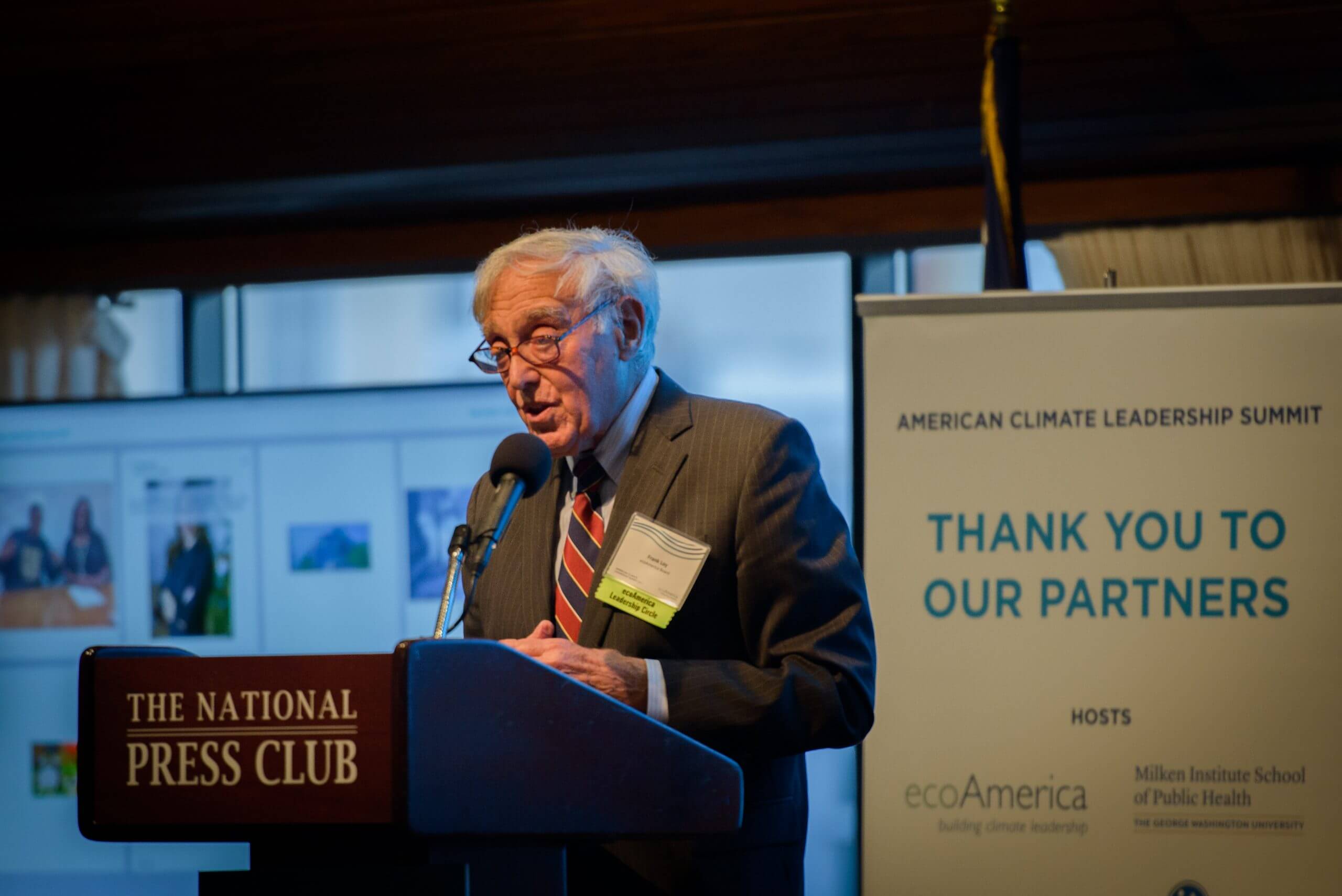A Conversation with Frank Loy

The following blog is a part of ecoAmerica’s Board of Directors Interview Series
Frank Loy was Under Secretary of State for Global Affairs from 1998 to January 2001. His portfolio included human rights, the promotion of democracy, refugees and population issues, international law enforcement, the environment — and he served as chief U.S. climate negotiator. He was a senior official in the State Department in two earlier administrations. From 1981 to 1995 he was president of The German Marshall Fund of the US, an American foundation dealing with political, economic and environmental issues concerning the US and Europe. He has been chair of a number of non-profit boards, including the Environmental Defense Fund, the League of Conservation Voters, Resources for the Future, and PSI, a family planning and health organization.
Q: You’ve had many influential positions in different aspects of public service in your career. How does climate change fit in with your current priorities now?
A: The degree to which you influence any decision depends on a mix of two factors (a) the significance and potential impact of the issue at hand, and (b) your role in shaping decisions at the time. Nothing I have ever dealt with, in terms of global significance, compares with my efforts to stem the change of our climate.

I was most engaged in shaping while, from late 1997 to the beginning of 2000, I was in the Department of State. We were faced with a dilemma: The US had just agreed to an international regime — the Kyoto Protocol — that had two flaws. Fatal flaws, as I saw it. It basically placed no obligations on any developing nations — including giants like China and India — and, partly because of that, we had zero chance of ever getting the agreement ratified by the US congress.
I viewed my job as directing our negotiations toward a new agreement that would correct these flaws. Which we did. Little did I know that it would take 20 years (!) to get to that new agreement — Paris, 2020.
During a much longer period — from around 1980 to today — I also sought to make change by my engagement with the NGO community, and the corporate world.
Q: As we move into a new administration that has a focus on climate action, how hopeful are you that we can make up for ground lost in the past 4 years?
A: The coming into office of the Biden administration is a huge positive development. Another 4 years of the Trump administration would have been a disaster of huge proportion. (I refer here to the climate issue, though this statement would be true in many respects.) But we need to be honest: you really can not make up the lost momentum of the last 4 years.
Q: What do you think is the most effective action we can take to reverse climate change?
A: The best action we can take is what ecoAmerica is doing — engaging leaders. That’s the missing link. ecoAmerica’s focus on health, faith, and local community sectors assists everyday leaders to inspire millions of Americans to climate action with leverage, reach, scale, and credibility.
There is no one “most effective action” that will effectively stop a change in our climate. We need to attack the climate challenge in numerous ways. We need:
- to make gas-consuming cars a thing of the past. Happy to see GM agrees. It won’t produce gas-consuming cars after 2035.
- to produce — more rapidly, more cheaply, and at a larger scale — alternative methods of producing energy (solar, wind, hydro, etc.) This is happening. Need more.
- better batteries to make alternative energy sources a more practical substitute for CO2-producing sources.
- an economic biofuel to serve the aviation sector, and probably other sectors.
- to install economic carbon capture, use and storage technology to reduce carbon emissions from the oil/coal/gas-using power and industrial plants that will surely remain around for quite a few years.
- to drastically reduce the destruction of our tropical rainforests.
- to develop an economic sustainable direct air capture technology, because the sum total of the above measures will not be enough.
This is a daunting — but doable — agenda. But it won’t happen unless there is broad support from Americans. The environmental community can reach and persuade some of those Americans. But many Americans don’t know anyone from that community, and don’t particularly trust them. But they do trust the leaders of their places of worship, their medical professionals, and their local elected leaders. Enlisting these local leaders in the climate cause, and educating them so they can become effective spokespersons, that is what ecoAmerica does. With skill and passion.
Q: What hope do you offer to Americans, especially young Americans on reversing climate change?
A: Regarding hope for our young Americans, we can beat climate change — but only if we put it at the top of our list. Both in terms of how we live, and what we demand of our elected officials.
About ecoAmerica
ecoAmerica builds institutional leadership, public support, and political resolve for climate solutions in the United States. We help national mainstream organizations elevate their climate leadership, providing them strategy, tools and resources to: demonstrate visible climate leadership, empower climate literacy, engage all constituents, and build collective action and advocacy. We help our partners transform into national climate leaders who inspire others on solutions. ecoAmerica.org
Want the convenience of getting ecoAmerica’s newsletter and blog in your inbox? Subscribe today!
Join ecoAmerica in the call for more ambitious and just climate action. Sign the MomentUs statement today.